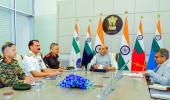'Pakistan is no longer a front-burner issue for America.'

"The Pakistani military has an incentive to play up the fact that its nuclear command and control could be disrupted or to make battlefield moves that raise the spectre of nuclear assets being mobilised.
"This is captured by the famous line of Stephen Cohen's, 'Pakistan negotiates with the world by holding the gun to its own head'," says Milan Vaishnav, senior fellow and director South Asia Programme at the Carnegie Endowment for Peace.
In an interview to Rediff's Archana Masih, Dr Vaishnav says that despite Donald Trump's attempts, there is no realistic expectation that America will shepherd peace talks between India and Pakistan or lead negotiations over Kashmir.
What are the significant markers/important takeaways about this ceasefire? What is its likely effectiveness and more importantly, will it hold?
There are too many takeaways to enumerate but let me start with just three.
First and most obviously, India has raised the bar for how it will respond to terrorist attacks above a certain threshold.
There has been an evolutionary progression -- from the surgical strikes after the Uri attack in 2016 to the bombings at Balakot in 2019 after the Pulwama attack and now the retaliation post-Pahalgam.
I think India has demonstrated that it has an expansive repertoire of actions it can take without taking undue risks when it comes to nuclear escalation.
The second lesson is the continued engagement of the United States despite its wishes to the contrary. Barely forty-eight hours before the ceasefire was announced, US Vice President J D Vance claimed that the India-Pakistan conflict was 'fundamentally none of our business' and that the fighting has 'nothing to do with America's ability to control it'.
Just a few days later, he was taking credit, alongside Secretary of State Marco Rubio, for brokering a ceasefire.
While there is likely a degree of overstatement in the Americans' rhetoric, it is striking that the 'America First' posture did not survive its first contact with reality -- namely the prospects of a protracted conflict between two nuclear-armed rivals.
Third and finally, I was gobsmacked by the extent of misinformation and disinformation at play, on both sides during the heat of the conflict.
Social media remains, in some ways, the quickest way to get 'battlefield' updates in real time and yet the so-called 'fog of war' was made even foggier by the deluge of fake news online.
When we talk of big data, AI, and the transparency of the battlefield, online news completely cuts against the grain.

What is your opinion of India-Pakistan relations (which are almost negligible) in the short term?
As Chris Clary has argued, I think we're living in a Middle East-like scenario where we will have bouts of relative calm punctuated by occasional flare-ups which will trigger occasional conflict.
I think both countries will remain on high alert for the near future; we are certainly no closer to an accord that resolves the grievances both sides feel.
From India's perspective, I do not think the fundamental calculus has changed: Why negotiate with a civilian government in Islamabad when that government has no ability to actually implement an accord?
It is clear that India cannot bomb Pakistan into submission, but it seems equally unlikely that talks at this juncture would be productive.
There has been much consternation about a. The ceasefire announcement coming from Donald Trump and b. His repeated assertions in Saudi Arabia and Qatar that he mediated the ceasefire. Why is Trump going to town with these claims?
Trump will say whatever comes in his mind at any given moment. Obviously, he has a vested interest both in making him the centre for the story and in claiming a win on the diplomatic front.
When it comes to active conflicts, Trump has little success on Israel-Gaza or Russia-Ukraine. He's looking to 'put wins on the board.'
Unlike other presidents who are attuned to the history and sensitives India has about third-party mediation and so on, Trump is steeped in none of this.
Or will there be a walk back by senior officials in the administration?
I think there already has been. There is no realistic expectation that America is going to shepherd peace talks between India and Pakistan or lead negotiations over Kashmir.
I expect the bureaucracy on the American side to continue as if Trump never made those statements.

How has Trump sullied the waters in the carefully crafted India-US relations area and do you reckon by doing so he has once again brought India-Pakistan on the same page, a hyphenation that India has worked really hard to eschew?
I don't think so. Frankly, there has been a real sea change in Beltway thinking on South Asia. India is where the action is and Pakistan is no longer a front-burner issue, especially after the US withdrawal from Afghanistan.
It sounds callous to say that, but I think this captures the overriding sentiment, from Capitol Hill to the White House.
I don't think hyphenation is here to stay. I think India and the United States are quite clear on that. But this is also why the continued economic dynamism of India is so important; it has given India space to separate itself from its Western neighbour.
Now with Trump eager to broker peace, do you think it is it entirely possible that another confrontation like this could get the Americans riding in?
Well, there is a pattern at play here. Once the nuclear saber-rattling starts, Americans feel the need to rush in. Honestly, one can understand the urge given the stakes at play. Clearly something happened to spook the Americans; whether this was real or instrumental remains to be seen.
The Pakistani military has an incentive to play up the fact that its nuclear command and control could be disrupted or to make battlefield moves that raise the spectre of nuclear assets being mobilised.
This is captured by the famous line of Stephen Cohen's, 'Pakistan negotiates with the world by holding the gun to its own head.'
Some in India have said that nuclear concerns constitute a false narrative. That might be true, but it does not mean that these concerns were not weaponised to compel the Americans to step in.

What does Trump's message to Tim Cook about making iPhones in India mean for India?
Keeping the realities of global manufacturing and cost factors, is it feasible for Apple to manufacture in the US compared to India?
Or is this typical Trumpspeak to put pressure on India in the ongoing trade negotiations?
In some way, this is even more disturbing to Indians that talk of third-party mediation. This statement of Trump's cuts to the heart of Modi's developmental agenda, which is 'Make in India'.
For India, luring Apple to India and making the country the de facto hub for iPhone production in the future has been a massive coup. It is one of the best examples we have of India exploiting the 'China+1' opportunity.
What India is hoping for is that the Apple example serves as a model for dozens of other major multinationals. For Trump to take aim at India's Apple experiment is to question the very premise of India's economic objectives.

What uncertainties and challenges does the US-China trade deal mean for India?
Well, I think it queers the pitch for sure. If the United States is going to make concessions to China, then India is going to drive a harder bargain.
Indeed, immediately after the deal, there were media reports circulating that India was considering levying retaliatory tariffs on steel and aluminum in a kind of tit-for-tat response to Trump's tariffs.
I don't think the China deal derails US-India bilateral talks, but it might pressure the Indian side to negotiate harder.
But make no mistake -- the Indians want a deal, the Americans want a deal, and both sides know a deal (however modest) is needed to unlock progress on other forms of collaboration (defence, science and technology, intelligence, etc).
Feature Presentation: Aslam Hunani/Rediff.com










